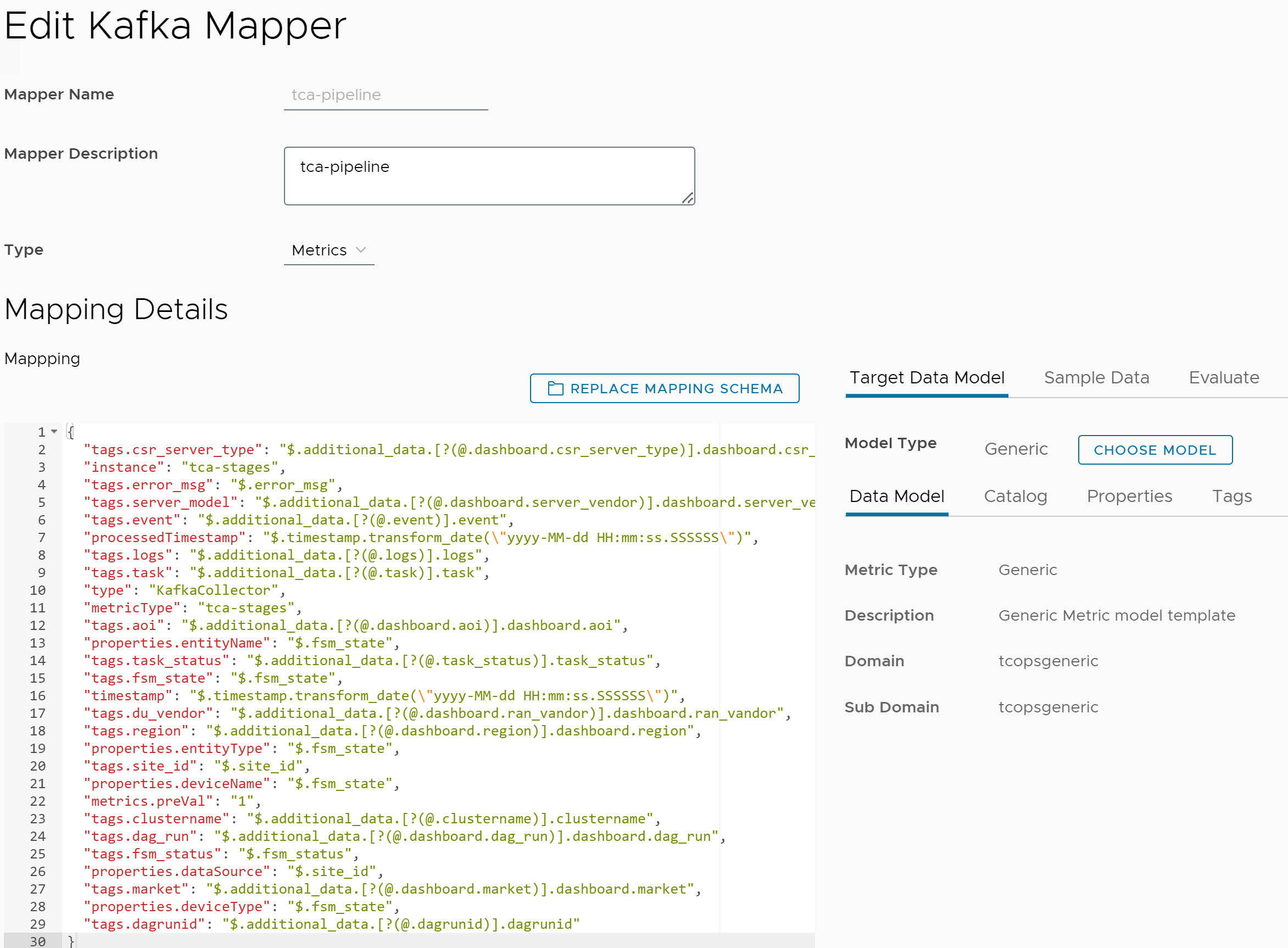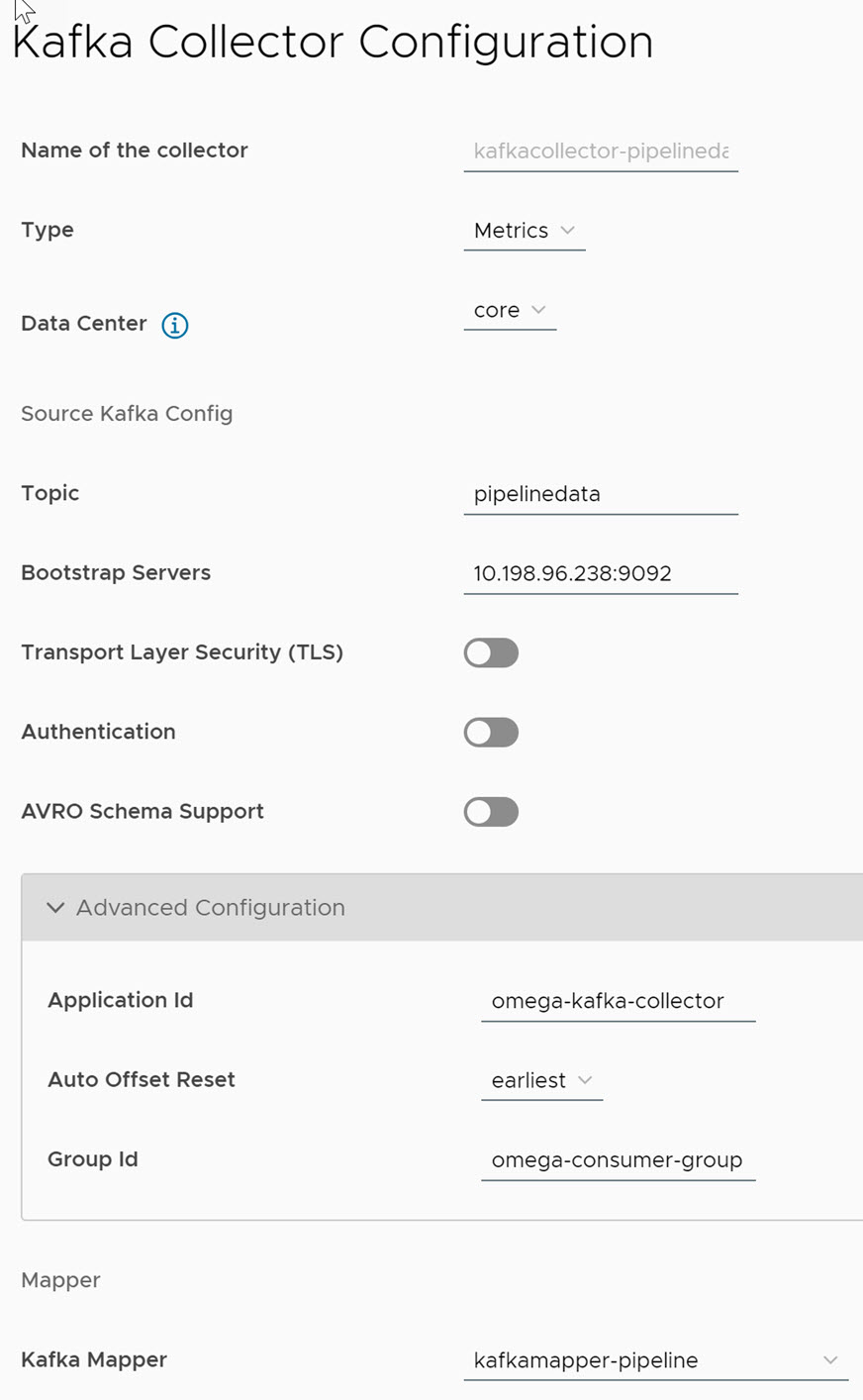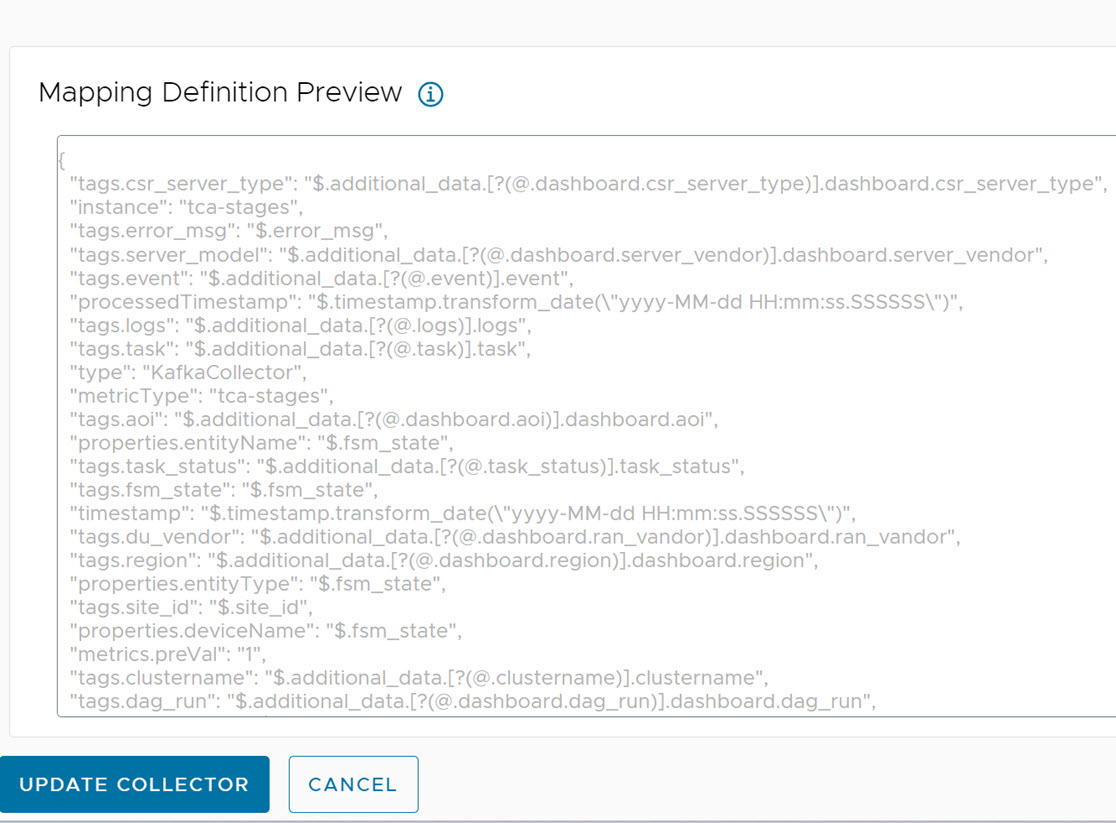To start the data flow for VMware Telco Cloud Automation Pipeline reports, you must configure the VMware Telco Cloud Service Assurance with Kafka brokers in Airflow, or Edge Kafka, or any external Kafka.
Prerequisites
- If you are using Kafka brokers in Airflow for ingesting the data into VMware Telco Cloud Service Assurance, then perform the following steps:
- For Kafka brokers, navigate to and configure kafka_brokers variable.
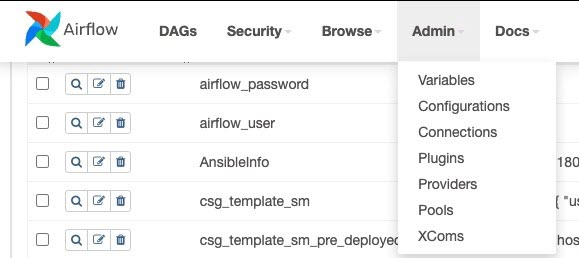 Note: Airflow used here is a third-party platform.Following is an example of kafka_brokers configuration in Airflow:
Note: Airflow used here is a third-party platform.Following is an example of kafka_brokers configuration in Airflow:[{ "bootstrap_servers": ["kafka-edge:32092 "], "topic": "tca-stages", "security_protocol": "SASL_SSL", "additional_properties" : { "sasl_mechanism": "SCRAM-SHA-512", "sasl_plain_username": "kafka-scram-sha-512-client-credentials", "sasl_plain_password" : "RDFYek9vSTJCNGRYCg==" }, "password": "Y2EucGFzc3dvcmQK", "ssl_cafile": "LS0tLS1CRUdJTiBDRVJUSUZJQ0FURS0tLS0tCk1JSUZMVENDQXhXZ0F3SUJBZ0lVVlcrT2lEYVlUM3QyeWh6T3lidHJEelFrcXB3d0RRWUpLb1pJaHZjTkFRRU4KQlFBd0xURVRNQkVHQTFVRUNnd0thVzh1YzNSeWFXMTZhVEVXTUJRR0ExVUVBd3dOWTJ4MWMzUmxjaTFqWVNCMgpNREFlRncweU1qQTVNVE14TWpJMU5UVmFGdzB5TXpBNU1UTXhNakkxTlRWYU1DMHhFekFSQmdOVkJBb01DbWx2CkxuTjBjbWx0ZW1reEZqQVVCZ05WQkFNTURXTnNkWE4wWlhJdFkyRWdkakF3Z2dJaU1BMEdDU3FHU0liM0RRRUIKQVFVQUE0SUNEd0F3Z2dJS0FvSUNBUUMyR2l6cTl0aEs2aHhqaS9PeDRlNHprVVdDK3hWQzVNTW5ybGlzSWUrWApyMXFVWllnNTJxYWxJc0NaeGlER1FiM3BMb3R4bTJGNEhOQm10NlJuVWQ3QkJwaHFkcys3MjFSanpRZ1BZbmYyCkVtU0doOHMrai8wWlMzMmQ0ZUtKKzMwMVlSa0ljSkNQa3dTOWN5SkNVMU95OWoyTG9FZ21PNnlSVmplVm9YaFEKYjJ3ZmpqY2d1bTFkYmNYanNSY1R1cHRxclk4MlJVbWVoL0pPbkh1d016TUFFUElBYU9WZEpvVytrRW5oTFF0Zwp3cEUvMHltNncxelhWZm5iSjlXZUNkcnUwaEdJZ2ZkaWZ1MUdJTnM4UDVCcmU2TGZhcjRvZmlYMXJLNENHMHZWCkxKTTJoS29DYm1zRGhpNXc3azgxZ1V4b3hicDBKMTZWQWs5UWtCdnZwVG5zZnBhTDh5ZWMwMTBRS1ZtS0VUQWgKMHFVZFhxRy9XaUE5bVZlaU1lY1owSlp1RTViY2hsZnVrdTFoT0dBRlVvdVVDaDJuV1lYcHg5azdueW01VlN5ZQpEb3puSU8rSkpLMWREVlZwbUVJaUJSbzRrZTBySVhBZ0ZMc3F1U2tLNStlWEZBUkJLVEdISUlEWWYzeFZKdVJ5CkVpWkQ4NGdrK0RpSC9kTThGWkFrTXpjRGdCaUdKTjA0QysralZNYXZqd0pNRzlVV2FhaGgzV3UraHBlY2g3VnMKT0VtaXRHRGxTWUszWHdMNktYSnUrRjMwZkNyYlBGc2xIaTFmTjR5OVRGWWo0UmFOSmREUG0rQmRtMDEvR0taUQpjakhNbWU0VzhTa3J4TlhxLzhwWTJhdVE4cEVYWmlWdlNPRHhDRmMwbEQzVisxUXo0WVVrZXhQanBuNTVUQ1RtCjd3SURBUUFCbzBVd1F6QWRCZ05WSFE0RUZnUVVsR0traFpZTTNUN0FyQmM1SGRLT2w1SWJlSDh3RWdZRFZSMFQKQVFIL0JBZ3dCZ0VCL3dJQkFEQU9CZ05WSFE4QkFmOEVCQU1DQVFZd0RRWUpLb1pJaHZjTkFRRU5CUUFEZ2dJQgpBSG9MM2I5V1JWZUc5dElPQzROcCtZanVWclBiaEtoaTY0UU8vVEw0OVdJVjNRYkxsV0tlRkhacUtQNkJKV29qCi9EYkFtUVNaeWxmbkNzejZubll0RDNJcnFjN2w5WENGNjAwZEZaRCtGNkp1dnpCdlFxR3VJYlAza0czOHlDdU4KQWdyWHBiaXlRQXhRMzhXSnRFSlc4UHFzVzZtdnFSSEY2YUt4VXg4eDF4dWZKSHY4aWcxcG9PT1VqNWZ1Y044QwpQUWY1NGEzWm5YajA2K0QxM1Q2dnh6dzRlMVQyVllYWEtCSEFDL0hIZ095akZpbUhJeDg3eU9Dczduc2Q3c0NwCnU4RE9aT21URWRlUEkxcW95R2w5VmNBdjdVdERjdHI2dmNmdHFHZ2dMNUtEaTVFd09odDdjL1VuNEd0OFQwQTUKNDRWejJvdnZvcDFkU1JuNWplVHFocmxxUTRCVENrb0tSUFIxeEduMmFid1oxOWJFMEVzOXhjMkhWVEk4cDBDYwpJT085SW1mcVptVlBqQjc3cmZSZVpNWmRtTmpqOVVmeHBJMGZvcXZKN21kTTFYNzR1S2tCbTVkbG1sdUFRRE5rCk9BUFdhMnVvVXJEOGhkSUgrT0MrTzFueE02SW9Odm85aU5sdDFUaGl1RC9Mb2EvMUw0YWljQk9pK2dKbjk0UWEKclpQVlo5d2RxNjYvT0VoNlpyZmtadU1iMmVaRUZmZDJzN1dPYW54V0s1YXlNTTZKbmJLUUhjQ25iUWJZUG1lVQpNenF5c090SWxqeWQ1VnVQbVlzLyt1RUd5S1V6U2RIN1NQYTloeXFGWWJKUmJTY09yVFdhNTlTazlCZ1dwREtqClJ0ZkdHdzRieUZsd2FNbW5kYk11L25hU0M2V005eVVsSWJFdmJzWk9hTDUxCi0tLS0tRU5EIENFUlRJRklDQVRFLS0tLS0K" }]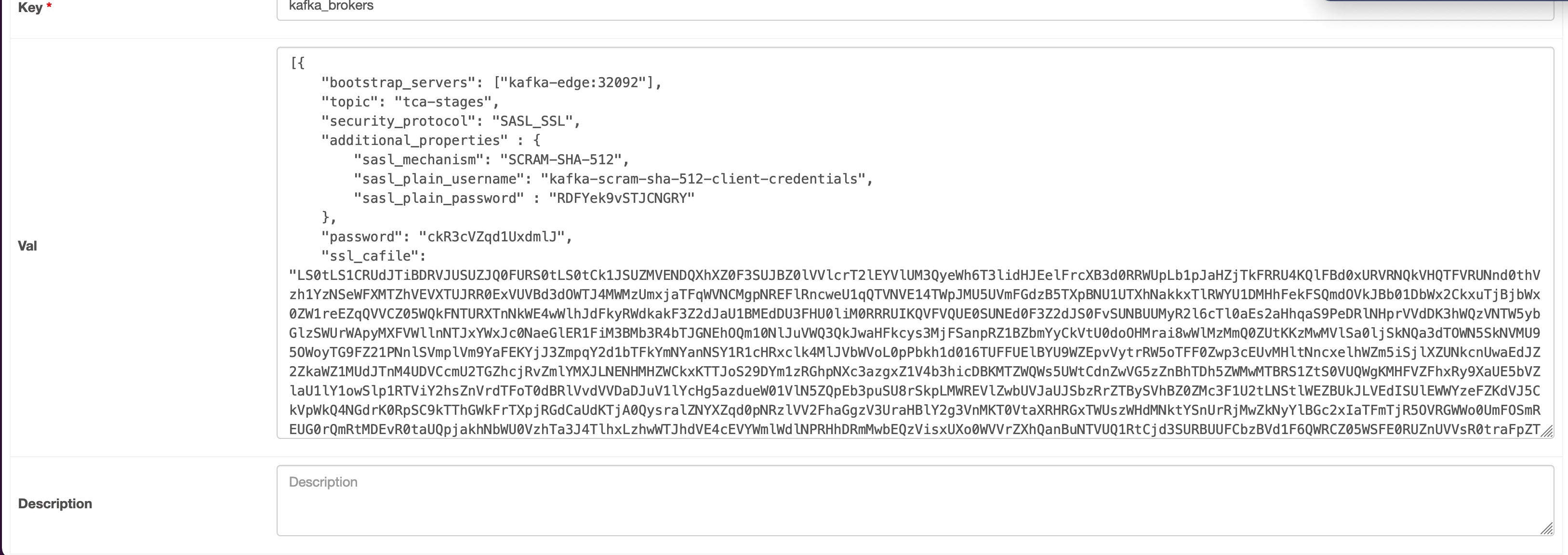 Get the passwords and certificate by executing the following commands from the VMware Telco Cloud Service Assurance deployment VM:
Get the passwords and certificate by executing the following commands from the VMware Telco Cloud Service Assurance deployment VM:ssl_cafile: export CLUSTER_NAME=edge EDGENS=kafka-edge kubectl get secret -n $EDGENS $CLUSTER_NAME-cluster-ca-cert -o jsonpath='{.data.ca\.crt}' | base64 --decode > ca.crt kubectl get secret -n $EDGENS $CLUSTER_NAME-cluster-ca-cert -o jsonpath='{.data.ca\.password}' | base64 --decode > ca.password sasl_plain_password: export USER_NAME=kafka-scram-sha-512-client-credentials export SCRAM_PASSWORD_FILE_PATH=user-scram.password kubectl get secret -n $EDGENS $USER_NAME -o jsonpath='{.data.password}' > $SCRAM_PASSWORD_FILE_PATH export SCRAM_PASSWORD=`cat $SCRAM_PASSWORD_FILE_PATH` - Run the following statefulset commands:
kubectl get statefulset -n airflow NAME READY AGE airflow-postgresql 1/1 78d airflow-redis 1/1 78d airflow-worker 3/3 78d capv@airflow-cnc-control-plane-vjbx5 [ ~ ]$
- For Kafka brokers, navigate to and configure kafka_brokers variable.
- If you are using Edge Kafka for ingesting data into VMware Telco Cloud Service Assurance, then perform the following steps from the VMware Telco Cloud Service Assurance Control Plane.
- Log in to the VMware Telco Cloud Service Assurance Control Plane and go to a temporary directory to work.
- Create a shell script with the following commands and execute it:
EDGENS=kafka-edge kubectl get secret -n $EDGENS $CLUSTER_NAME-cluster-ca-cert -o jsonpath='{.data.ca\.crt}' | base64 --decode > ca.crt kubectl get secret -n $EDGENS $CLUSTER_NAME-cluster-ca-cert -o jsonpath='{.data.ca\.password}' | base64 --decode > ca.password export CERT_FILE_PATH=ca.crt export CERT_PASSWORD_FILE_PATH=ca.password export KEYSTORE_LOCATION=cacerts export PASSWORD=`cat $CERT_PASSWORD_FILE_PATH` export CA_CERT_ALIAS=strimzi-kafka-cert keytool -noprompt -importcert -alias $CA_CERT_ALIAS -file $CERT_FILE_PATH -keystore $KEYSTORE_LOCATION -keypass $PASSWORD -storepass $PASSWORD export USER_NAME=kafka-scram-sha-512-client-credentials export SCRAM_PASSWORD_FILE_PATH=user-scram.password kubectl get secret -n $EDGENS $USER_NAME -o jsonpath='{.data.password}' | base64 --decode > $SCRAM_PASSWORD_FILE_PATH export SCRAM_PASSWORD=`cat $SCRAM_PASSWORD_FILE_PATH` - Files below shall be generated by executing the script in the previous step:
ca.crt —> The TCSA Edge Kafka certificate. ca.password —> The TCSA Edge Kafka certificate password. cacerts —> The keystone/truststore file with the Edge Kafka certificate. user-scram.password —> The SASL password.
- Make note or send the follow information to have the Kafka Producer configured to send messages to the TCSA Edge Kafka:
Hostname: kafka-edge TCP/IP Port: 32092 Topic: tca-stages Security Protocol: SASL_SSL SASL Mechanism: SCRAM-SHA-512 SASL Plain Username: kafka-scram-sha-512-client-credentials SASL Plain Password: <contents of file user-scram.password generated in step 2> SSL Certificate: <contents of file ca.crt generated in step 2> SSL Certificate Password: <contents of file ca.password generated in step 2>
Note: Also send thecacertsfile generated in step to all Kafka Producers that will generate messages to the VMware Telco Cloud Service Assurance Edge Kafka. - Log out from the VMware Telco Cloud Service Assurance Control Plane.
- Perform the following steps for each Kafka Producer that will generate messages to the VMware Telco Cloud Service Assurance Edge Kafka:
- Log in to the Kafka Producer machine via a CLI (For example, SSH)
- Add the following entry to the machine’s
/etc/hostsfile where<TCSA-CLUSTER-VIP>is the external IP address of the VMware Telco Cloud Service Assurance Cluster.:<TCSA-CLUSTER-VIP> kafka-edge
- Copy the
cacertsgenerated in step 2 in to the directory where the truststores are located or create a directory to place it if needed and make note of the path. In this procedure, this path will be called<TRUSTSTORE_PATH>. - Create a temporary file with a sample message to be sent to the VMware Telco Cloud Service Assurance Edge Kafka and make note of its path. In this procedure, this path will be called
<SAMPLE_DATA_PATH>. - Verify if messages can be sent from the Kafka Producer machine to the VMware Telco Cloud Service Assurance Edge Kafka by executing the following command:
<KAFKA_PATH>/bin/kafka-console-producer.sh \ --bootstrap-server <EDGE_KAFKA_HOST>:<EDGE_KAFKA_PORT> \ --topic <EDGE_KAFKA_TOPIC> \ --producer-property ssl.truststore.location=<TRUSTSTORE_PATH> \ --producer-property ssl.truststore.password=<CA_PASSWORD> \ --producer-property sasl.mechanism=<SASL_MECHANISM> \ --producer-property security.protocol=<SECURITY_PROTOCOL> \ --producer-property 'sasl.jaas.config=org.apache.kafka.common.security.scram.ScramLoginModule required \ username="<SASL_USERNAME" \ password="<SASL_PASSWORD>";' < <SAMPLE_DATA_PATH>
where
<KAFKA_PATH>is the path where Kafka has been installed in the Kafka Producer machine.<EDGE_KAFKA_HOST>is the Hostname shown in step 4.<EDGE_KAFKA_PORT>is the TCP/IP Port shown in step 4.<EDGE_KAFKA_TOPIC>is the Topic shown in step 4.<TRUSTSTORE_PATH>is the path chosen in step 8.<CA_PASSWORD>is the contents of the “ca.password” file generated after executing step 2.<SASL_MECHANISM>is the SASL Mechanism shown in step 4.<SECURITY_PROTOCOL>is the Security Protocol shown in step 4.<SASL_USERNAME>is the SASL Plain Username shown in step 4.<SASL_PASSWORD>is the SASL Plain Password shown in step 4.For example:/opt/kafka/bin/kafka-console-producer.sh \ --bootstrap-server kafka-edge:32092 \ --topic tca-stages \ --producer-property ssl.truststore.location=$JAVA/HOME/lib/security/cacerts \ --producer-property ssl.truststore.password=mypwd \ --producer-property sasl.mechanism=SCRAM-SHA-512 \ --producer-property security.protocol=SASL_SSL --producer-property 'sasl.jaas.config=org.apache.kafka.common.security.scram.ScramLoginModule required \ username="kafka-scram-sha-512-client-credentials" \ password="mysaslpwd";' < ~/mysamplefile.txt
- Verify if the message(s) were indeed sent to the VMware Telco Cloud Service Assurance Edge Kafka by executing the following command:
<KAFKA_PATH>/bin/kafka-console-consumer.sh \ --bootstrap-server <EDGE_KAFKA_HOST>:<EDGE_KAFKA_PORT> \ --topic <EDGE_KAFKA_TOPIC> \ --from-beginning \ --consumer-property ssl.truststore.location=<TRUSTSTORE_PATH> \ --consumer-property ssl.truststore.password=<CA_PASSWORD> \ --consumer-property sasl.mechanism=<SASL_MECHANISM> \ --consumer-property security.protocol=<SECURITY_PROTOCOL> \ --consumer-property 'sasl.jaas.config=org.apache.kafka.common.security.scram.ScramLoginModule required \ username="<SASL_USERNAME" \ password="<SASL_PASSWORD>";'
Note: use variables as per instructions in step 5.For example:/opt/kafka/bin/kafka-console-consumer.sh \ --bootstrap-server kafka-edge:32092 \ --topic tca-stages \ --from-beginning \ --consumer-property ssl.truststore.location=$JAVA/HOME/lib/security/cacerts \ --consumer-property ssl.truststore.password=mypwd \ --consumer-property sasl.mechanism=SCRAM-SHA-512 \ --consumer-property security.protocol=SASL_SSL \ --consumer-property sasl.jaas.config='org.apache.kafka.common.security.scram.ScramLoginModule required \ username="kafka-scram-sha-512-client-credentials" \ password="mysaslpwd";'
- Finally, configure the desired Kafka Producer. If it is a custom application use variables in step 4 from the previous bullet to establish connectivity. If it is a Kafka utility, you can use a configuration file populated with variables in step 4 from the previous bullet according to the utility instructions.
- If you are using Edge Kafka for ingesting data into VMware Telco Cloud Service Assurance, then perform the following steps from the deployment host.
- Install Kafka.
- Export KUBECONFIG=
<KUBECONFIG-file-location>EDGENS=kafka-edge kubectl get secret -n $EDGENS $CLUSTER_NAME-cluster-ca-cert -o jsonpath='{.data.ca\.crt}' | base64 --decode > ca.crt kubectl get secret -n $EDGENS $CLUSTER_NAME-cluster-ca-cert -o jsonpath='{.data.ca\.password}' | base64 --decode > ca.password export CERT_FILE_PATH=ca.crt export CERT_PASSWORD_FILE_PATH=ca.password export KEYSTORE_LOCATION=cacerts export PASSWORD=`cat $CERT_PASSWORD_FILE_PATH` export CA_CERT_ALIAS=strimzi-kafka-cert keytool -noprompt -importcert -alias $CA_CERT_ALIAS -file $CERT_FILE_PATH -keystore $KEYSTORE_LOCATION -keypass $PASSWORD -storepass $PASSWORD export USER_NAME=kafka-scram-sha-512-client-credentials export SCRAM_PASSWORD_FILE_PATH=user-scram.password kubectl get secret -n $EDGENS $USER_NAME -o jsonpath='{.data.password}' | base64 --decode > $SCRAM_PASSWORD_FILE_PATH export SCRAM_PASSWORD=`cat $SCRAM_PASSWORD_FILE_PATH` <<KAFKALOCATION>>/bin/kafka-console-producer.sh --broker-list kafka-edge:32092 --producer-property security.protocol=SASL_SSL --producer-property sasl.mechanism=SCRAM-SHA-512 --producer-property ssl.truststore.password=$PASSWORD --producer-property ssl.truststore.location=$PWD/cacerts --producer-property sasl.jaas.config="org.apache.kafka.common.security.scram.ScramLoginModule required username=\"$USER_NAME\" password=\"$SCRAM_PASSWORD\";" --topic metrics < ${5Gdatadump}
- If you are using external Kafka to ingest data into VMware Telco Cloud Service Assurance, then perform the following steps:
- Install Kafka in any RHEL host.
- Start Zookeeper.
${KafkaInstallLocation}/bin/zookeeper-server-start.sh -daemon ${KafkaInstallLocation}/config/zookeeper.properties - Start Kafka Server.
${KafkaInstallLocation}/bin/kafka-server-start.sh -daemon /${KafkaInstallLocation}/config/server.properties - Start Kafka Producer.
${KafkaInstallLocation}/bin/kafka-console-producer.sh --bootstrap-server ${kafkahost}:${kafkaport} --topic ${KafkaTopicname} < ${5Gdatadump}

